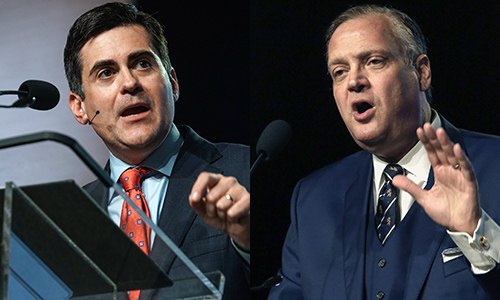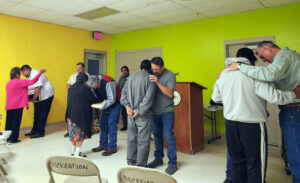
ST. LOUIS (BP) — The Revoice Conference for “LGBT Christians,” which provoked a messenger question at June’s Southern Baptist Convention annual meeting, continued to draw a range of responses from Southern Baptists as it convened July 26-28.
 Revoice states its aim on the conference website as “Supporting, encouraging, and empowering gay, lesbian, same-sex-attracted, and other LGBT Christians so they can flourish while observing the historic, Christian doctrine of marriage and sexuality.” The conference is being hosted by St. Louis’s Memorial Presbyterian Church, which is affiliated with the theologically conservative Presbyterian Church in America.
Revoice states its aim on the conference website as “Supporting, encouraging, and empowering gay, lesbian, same-sex-attracted, and other LGBT Christians so they can flourish while observing the historic, Christian doctrine of marriage and sexuality.” The conference is being hosted by St. Louis’s Memorial Presbyterian Church, which is affiliated with the theologically conservative Presbyterian Church in America.
One conference session, according to the website, explores the question, “What queer treasure, honor, and glory will be brought into the New Jerusalem at the end of time?” Another addresses “the experience of non-straight individuals who are in opposite-sex marriages.”
Among Southern Baptists, Southern Baptist Theological Seminary President R. Albert Mohler Jr. has criticized some aspects of the conference, as have the Ethics & Religious Liberty Commission staff and Denny Burk, president of the Council on Biblical Manhood and Womanhood.
Karen Swallow Prior, an English professor at Liberty University and an ERLC research fellow, has endorsed the stated goals of the conference. Research fellows meet once a year for a two-day meeting and do not speak for the organization, according to the ERLC.
Conference founder Nate Collins identifies himself online as a “married, same-sex attracted/gay man” and a former “instructor of New Testament” at Southern. He earned his doctor of philosophy degree from Southern in 2017.
The seminary told Baptist Press it employed Collins in some capacity from 2014 until the spring of 2018, but he held the title “instructor” only in 2015-2016, when he taught elementary Greek as a doctoral student in New Testament. His other roles included online teaching assistant, grader and tutor. Mohler told BP Collins has never been a faculty member, adding, “I would not allow anyone associated with The Southern Baptist Theological Seminary or Boyce College to be involved in this [Revoice] conference.”
Collins told Christianity Today July 25 that Revoice organizers affirm “a traditional, historic understanding of sexuality in marriage” and “are not advocating that people use one language over the other” to describe the experience of same-sex attraction.
Still, Mohler said the conference is “deeply troubling.”
“It is encouraging that they state their intention to hold to a biblical understanding of sexual behavior,” Mohler said of Revoice, “and to define the only appropriate expression of sexual behavior to be marriage as the union of a man and a woman. But that said, it appears they’re trying to create a halfway house” between cultural norms and biblical morality “that is inherently unstable. There is no way that faithful Christians can celebrate an unbiblical sexual orientation and claim to be faithful to Scripture.”
Mohler added, “The moment you begin identifying as an LGBTQ+ Christian, you’ve created an unstable identity.” Humans “have a pattern of sexual attraction, but for Christians, our ultimate identity must be in Christ.”
ERLC President Russell Moore expressed a similar view when asked by an SBC messenger June 13 to comment on the appropriateness of the terms “gay Christian” and “sexual minorities.”
“Our identity is to be found in Jesus Christ,” Moore said, “not in the sum of our temptations.”
When asked by a separate messenger whether the ERLC would “disavow” Revoice and whether it would retain Prior as a fellow, Moore said, “I don’t know about the Revoice Conference, but I do know” Prior “has committed herself to go anywhere and everywhere and stand up and tell the truth about God’s Word about human sexuality.”
The week following the SBC annual meeting in Dallas, Moore recommended via Twitter an article by ERLC staff member Andrew Walker on Revoice. Walker commended Revoice for supporting “any same-sex attracted Christian … trying to find their identity in Christ,” but he cautioned that “the conference’s programming and the casual embrace of finding one’s identity in what the Scriptures prohibit, seems to be an enormous miscalculation with real-world implications.”
An ERLC spokesman told BP July 26 Walker’s article “represents the entire organization’s concerns with the Revoice Conference.”
Prior affirmed her endorsement of Revoice in a July 26 email and referred BP to an online interview with the blog English Manif, which advocates traditional marriage and is geared toward a male readership, according to the blog’s descriptor.
Prior affirmed to English Manif June 16 that as an ERLC fellow, she is accountable to the SBC’s ethics entity. She added in the written interview, “Even some of my colleagues in the ERLC have written in opposition to the conference. I share some concerns about the language and terms used by some of the conference speakers. I think some terms are unclear, ill defined, and perhaps unfortunate.
“However, the need to understand what people mean by these terms and how they are used within the context of their endeavors to honor God and the scriptures through sexuality that is in submission to scripture points to the very need for such a conference,” Prior said. “The aim of the conference is biblical faithfulness even amidst the struggle, and that is why I endorse it. That does not mean I endorse every speaker, every panel, every presentation. Again, I want to support those who are attracted to the same sex but choose obedience to God rather than indulgence to self.”
Denny Burk, president of the Council on Biblical Manhood and Womanhood (CBMW), told BP he is “grateful” Revoice’s organizers “are committed to celibacy [outside biblical marriage] and that we share the same definition of marriage as uniting one man and one woman. These are not small things.”
Yet Burk, a biblical studies professor at Southern’s Boyce College, also critiqued the conference, noting, “The differences we are adjudicating are important and mark a watershed moment for evangelicals.”
Burk commended the 2017 Nashville Statement on biblical sexuality as expressing “a more faithful, biblical vision” than that of Revoice. Among the Nashville Statement’s affirmations: Adoption of “a homosexual or transgender self-conception” is inconsistent with God’s purposes.
The Nashville Statement was drafted in August 2017 as a joint venture of CBMW and the ERLC Research Institute during an ERLC national conference. Mohler, Moore, Walker, Prior, and Burk all were among the initial signatories.
In October 2017, Southern’s trustees made The Nashville Statement one of the seminary’s confessional documents, which all professors are required to affirm.
“Will evangelicals recognize that biblical teaching about human sexuality is worth preserving in the face of serious error?” Burk asked in written comments. “That is what is at stake here, and how we answer the question will determine how we exhort and encourage struggling sinners. The answer to the question has implications for everyone who experiences desire as a son or daughter of Adam, which means that it implicates all of us, not just those who struggle with same-sex desire. The stakes are high.
“We are not arguing about how many angels can dance on the head of a pin. We are addressing real-life, serious questions. I don’t think the proponents of Revoice are providing faithful answers,” Burk said.
















